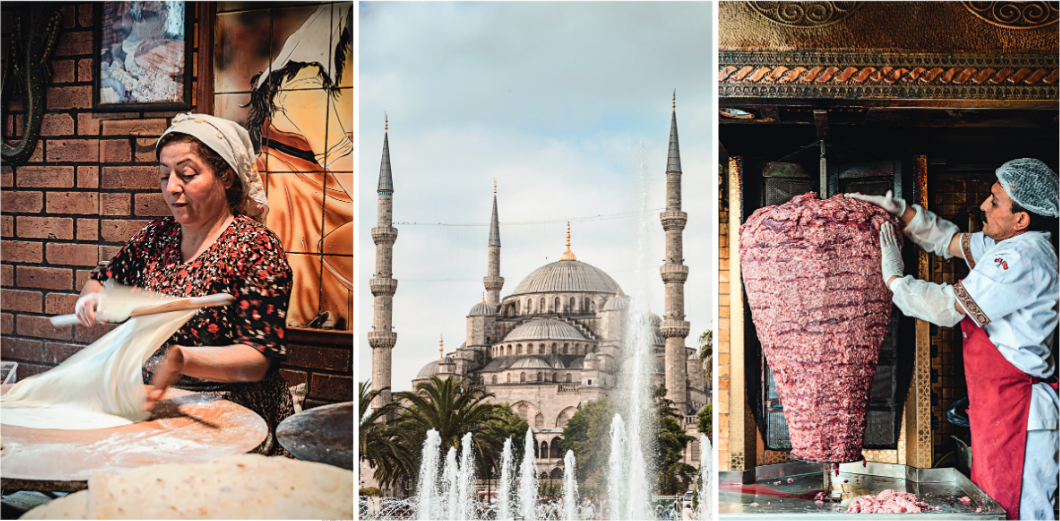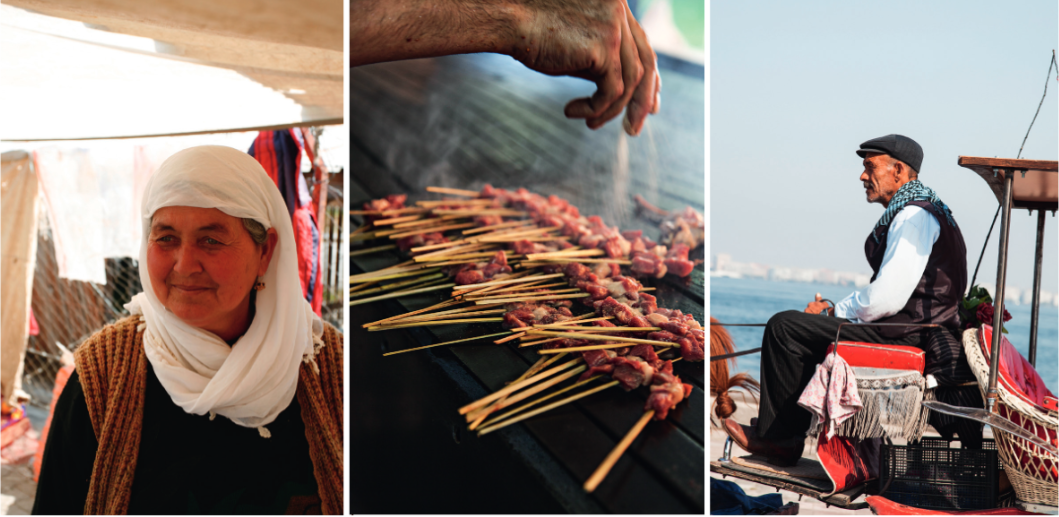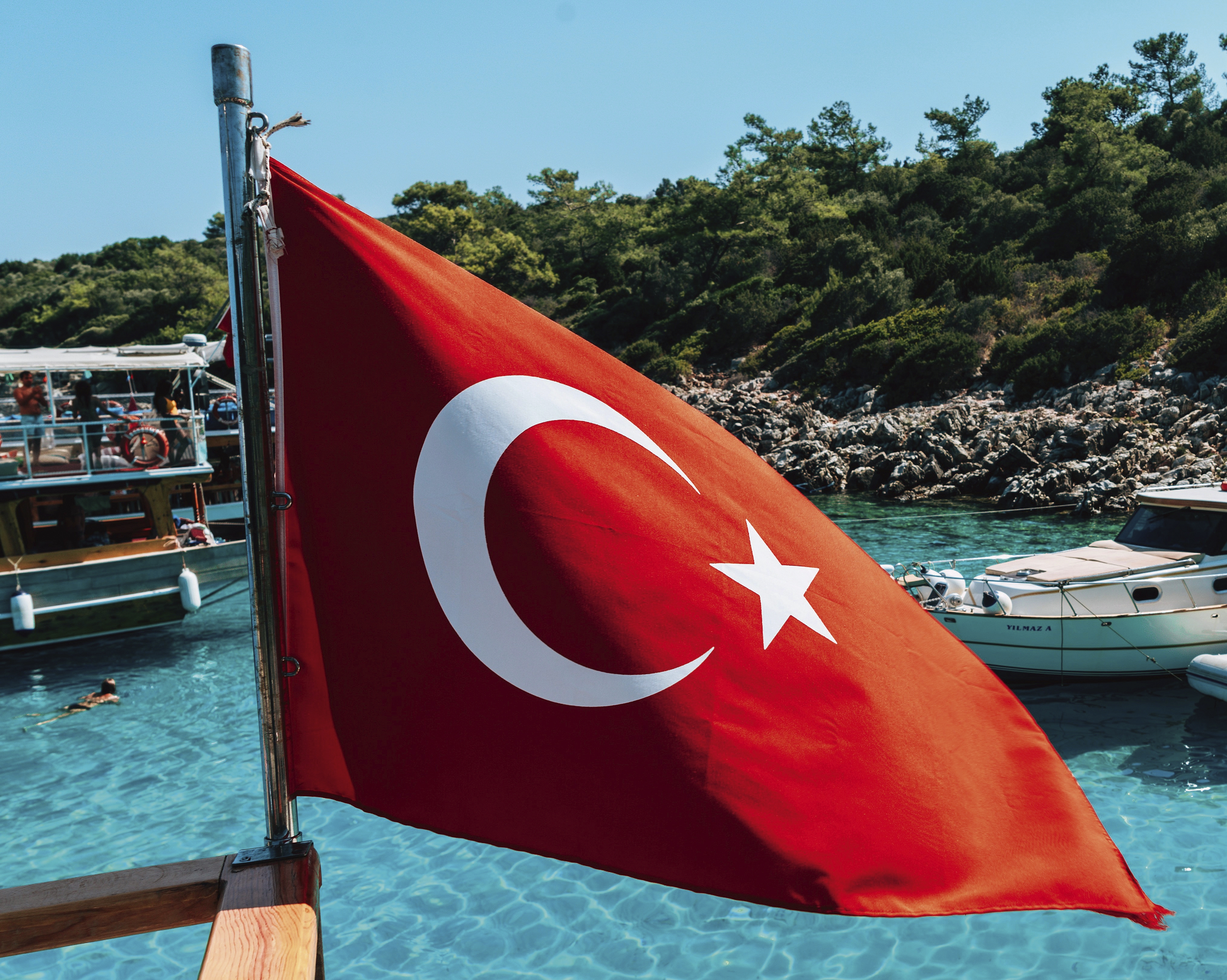Get Premium access to all the latest content online
Subscribe and view full print editions online... Subscribe
A childhood spent exploring crumbling ruins gave chef Civan Er a lifelong interest in his country’s history, and an ambition to capture the diversity of Türkiye’s complex cuisine at his restaurants in Istanbul and London
Words by Lucy Kehoe

When Civan Er reminisces
about childhood holidays, he doesn’t talk about food.
Instead, early memories of
family trips to Türkiye’s western
coast centre on days spent
exploring antiquated ruins,
scrabbling over the rubble
of Troy, and gazing up at
crumbling pillars and sun-baked
stones of historically important
sites like Ephesus.
‘I started going there from the age of nine or ten, Civan explains. ‘We used to spend the summer with my grandparents, renting a house. We’d visit cities that were 2,000 years old and I’d think, “I’m witnessing history.”’
Most visitors to Türkiye’s vast Aegean coast head straight for Bodrum’s yachting culture or the bustle of Izmir. For Civan, though, it’s the ancient ruins that entice. Whichever way you look, the coast that stretches some 500km from the Balkans down to the Mediterranean is beautiful. Gaze out over the sea and you’ll catch sight of the Greek islands, caught in a blue haze; turn towards the interior and hills rise and fall, furred by scented foliage and spined by ragged rocks. ‘It’s a different side of Türkiye,’ says Civan. ‘It’s more authentic, untouched.’
Today, Civan lives between his home city of Istanbul and London, but visits the Aegean region a few times a year. A rental is no longer required: the chef and his wife now have a house on the tip of the Karaburun peninsula. It’s a remote, tranquil and windy spot – ‘but we fell in love with that’ – and, according to the chef, is best visited in spring or winter, when the only other visitors are a few Turkish retirees.
Hotels, restaurants and wineries are few and far between on Karaburan; Civan holds a special place in his heart for one rustic b&b, Lipsos, a short stroll from his home, and where he married. Run by an restaurant serves up catches including crisp kalamar (calamari), buttery grilled prawns and seafood pastas dusted with the chef’s homemade bottarga. Civan says. ‘Everyone in that area is a fisherman.'
‘The soil [in western Türkiye] is very fertile too – one of the reasons why people have been living there for thousands of years. You can get three crops out of the soil in the same year: peppers, aubergines, tomatoes – any vegetable you can think of.’ Small village meyhane (from the Persian for ‘wine house’) serve simple dishes that make think thick slices of sweet, juicy tomato dressed in olive oil.
Look out for kokoreç on menus too. The dish of lamb sweetbreads and large intestine wrapped with small intestines and grilled over charcoal is ‘one of the highlights’ of the region, Civan says, alongside, – cold cuts of cooked lamb tongue, cheek and brain doused in sumac and parsley, and served with tomatoes and onion in a flatbread.
The Yeni chef prefers both with a beer, although you’ll most likely be offered stringent sips of raki, the local tipple. It’s the same story at rustic restaurants like Çetin’in Yeri, an hour’s drive from Lipsos. ‘They serve roast baby goat in the garden,’ says Civan, ‘with raki and beer to drink.’

Turkish cuisine is always of interest to Civan: growing up in removed from Istanbul’s centre, he was more interested in baking cakes. ‘My grandmother was a terrible cook,’ he jokes, as he remembers holiday meals in the Aegean of ready-made pizzas. And, while his mother cooked memorable traditional Turkish dishes like manti dumplings, he was more interested in the glittering photos of fancy bakes found within the pages of the food magazines she brought home. ‘I used to look at those magazines for hours, deciding what I wanted to try,’ he says.
Perhaps that pizza was more impactful than he realised, though. His first forays into cooking were through Italian cuisine, using internet-researched recipes he found while studying economics at Marmara University in north-western Türkiye. A 2003 move to London to complete a master’s degree followed, and it was there he caught the bug, working as a chef at Sofra in St John’s Wood, later training at Leiths before returning to Istanbul to work at the legendary Changa.
Yeni Lokanta, opened in Yeni, in London’s Soho, followed in January 2019. Both restaurants plate up menus that draw on Türkiye’s geographical and culinary diversity, borrowing Balkans region and as far south as the Syrian-Turkish border.
‘Turkish food is the food of all these ethnicities who have moved through Türkiye, or the state of Anatolia,’ says Civan. ‘I look at the food in Aleppo, in Syria, and don’t see it as foreign because it’s my food too.’
Istanbul acts as a culinary crossroads for these diverse rattles the cobblestones, the chef sees its capricious nature as its strength. ‘It’s an ancient city and it’s always evolving,’ he says. ‘There are different ethnicities and backgrounds. The meze culture is dominated by the Armenian people of Istanbul; when you talk about Greeks; and if it’s kebabs, they’re from the Kurds.’
And the easiest way to start exploring it all? ‘Breakfast is very important for Turkish people,’ Civan laughs. ‘It’s a huge thing; we spend a lot of time sitting at the breakfast table, especially at the weekend.’

A traditional Turkish morning spread – kahvalti – includes fresh cheeses, kaymak cream, honey, doughy simit bread, honey, plump olives, sucuk spicy sausage, pastries and cold meats. ‘There are a lot of dishes on the menu, which makes it interesting for visitors,' Civan says. At the weekend, you’ll Cihangir brunch spot with a leafy, sun-dappled courtyard.
History is never far from the chef’s mind, including when doling out recommendations for exploring. Everyone should visit the famous Egyptian Bazaar to get a taste of the city’s ancient trading history (his spice suppliers still have a stall there) and as far as favourite restaurants go, the legendary most knowledgeable when it comes to Turkish food culture.’
Some of the country’s most famous dishes originate from its southern border. ‘The south is famous for kebabs, baklava lahmacun – food there is mainly citing Antakya, the historic city hit by a devastating earthquake in 2023, and the pistachio- fuelled Gaziantep (or Antep) as two memorable gastronomic destinations. ‘Antep does the best baklava in Türkiye. You’ll beautiful, freshly made pastries everywhere,’ he says.
Antep’s kebab prowess is no less impressive. ‘The craftsmanship is something else,’ he continues. ‘All the kebab houses in Türkiye get their people from here, and it’s the same in London. I had this aubergine kebab there that was so good – just grilled aubergine with a little yoghurt, and laid on top of that, this lamb kebab.’ What made it so special isn’t as city,’ Civan shrugs. ‘It’s been the same people for thousands of years, and they’ve developed a deep-rooted tradition.’
Civan’s London and Istanbul restaurants may plate up under the label of modern Turkish cuisine, but it’s clear his inspirations are rooted in his country’s far-reaching food culture. With trips to sun- scorched Antakya off the cards, he’s sticking with the Aegean coast on holidays for now. It helps that the climate is a little more tolerable on the western coast. ‘After all, there’s a reason why all those civilisations started in that area,’ he laughs.

CIVAN ER'S HOTSPOTS
BODRUM RETREAT,
YALIKAVAK
These rustic properties
furnished with antiques, in
the hills overlooking the
Aegean 20 minutes from
Bodrum, are run by dynamic
duo Frank Marciano and his
wife. Ask to taste Frank’s
homemade amaro and strega
liquors. bodrumretreat.info
NISANYAN HOTEL, EPHESUS An elegant boutique hotel and restaurant. Produce is grown on-site, and traditional breakfasts that include an array of fresh cheeses, homemade sweets and pastries are served all day. Co-founder Mujde runs cooking workshops on Aegean cuisine too. nisanyan.com
MIKADO PIDECISI, BOZDOGAN A much-loved local pide restaurant around two hours’ drive from Bodrum. The meat and tahini pides are not to be missed. mikadopide.com.tr
URLICE VINEYARDS, URLA Organic, 8ha winery and restaurant not far from Izmir. Book ahead for wine tasting or sample house pours by the glass at the café. urlice.com
SOFIA AYVALIK A talented chef plates up local produce in coastal Ayvalik. Worth the two-hour drive from Izmir. sofiaayvalik.com
KIYI, ISTANBUL Yorgi Sabuncu's harbourside restaurant has been in business for nearly a century, offering celebrated grilled Bosphorus fish and top-notch meze. kiyi.com.tr
ÇIYA SOFRASI, ISTANBUL This no-frills restaurant, located in Kadiköy Market, serves traditional recipes from across the country. ciya.com.tr
This article was taken from the April 2024 issue of Food and Travel. To subscribe today, click here.

Subscribe and view full print editions online... Subscribe